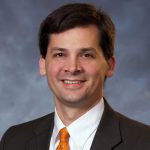 NEWS: Senate expected to change rules to create new presiding officer
NEWS: Senate expected to change rules to create new presiding officer
BRIEFS: More revenue, less education, other information
COMMENTARY, Brack: Some tonics to soothe an unhappy America
SPOTLIGHT: S.C. Senate Democratic Caucus
FEEDBACK: Send us your thoughts …or rants!
MYSTERY PHOTO: Who’s this guy?
S.C. ENCYCLOPEDIA: Carolina, the 1663 ship
NEWS: Senate expected to change rules to create new presiding officer

By Lindsay Street, Statehouse correspondent | The South Carolina Senate is poised to create a new, powerful position upon the start of a new session in January, and Republican Education chairman Harvey Peeler of Cherokee is likely to fill that position, according to senior Republican leadership sources.

In years past, the lieutenant governor has presided over the state Senate. But with a constitutional amendment that put the governor and lieutenant governor on a joint ticket in 2018, the role of lieutenant governor changed to be squarely in the executive branch. To adapt, the Senate Rules Committee has drafted a proposal that creates the new position of “President of the Senate” to be the Senate’s presiding officer.
“The rules are going to have to be changed to deal with that [constitutional change],” Rules Chairman Shane Massey, R-Edgefield, said this week.
He said, the Rules Committee will need to pass the proposed rule change on the first day of session, Jan. 8, and then the full body will have the opportunity to adopt it. He added it will be similar to the House getting its body in order after an election, like it just went through.
Once the rule passes, the Senate then will elect the president, assign new committee chairs as needed, and elect new officers, such as the chamber’s sergeant-at-arms.
“This is all just talk until the Senate actually votes on it,” Massey said.
S.C. Sen. Greg Hembree, who suffered and recovered from a brain aneurysm this summer, served on the Rules subcommittee that drafted the proposal. He said the proposal has not met any opposition and was drafted with “a general spirit of cooperation.”
“Nothing’s final until we vote on it, but it seems we have reached a consensus,” Hembree said.

The new Senate president would vote as a member of the Senate and any tied votes would fail, Massey said. The president would also assume the responsibilities of the current president pro tempore of the Senate, a position currently held by Finance Chairman Hugh Leatherman, R-Florence.
But the proposal would prevent the president from chairing any current standing committees in an effort “to diffuse power,” Massey said. According to multiple sources, Leatherman has strongly signaled he would not seek the president’s position so he could maintain his Finance chairmanship.
A new committee, too
However, the president could head a new standing committee being proposed for the Senate: the Senate Oversight Committee.
“We think we can do a better job than we have been doing,” Massey said of the proposed committee.

Hembree added the oversight committee would be modeled after the House’s committee. He called the proposed committee “a very good thing.”
Under the proposed rule change, the president position will not be limited to seniority or majority party. The Senate presidency will depend on votes, Massey said. Currently, Peeler appears to be the only name being floated to serve as Senate president. If he is elected under the current proposal, then the Education Committee would require a new chair, which is offered to majority lawmakers based on seniority.
Hembree is the likely member to fill the seat, according to multiple sources, including Hembree.
Hembree said he is preparing for the possibility of taking over the Education committee since session would be underway by the time the vote is made.
“By January, it will be on,” Hembree said. He called education in the state “very nuanced” and said he is starting his homework now.
- Have a comment? Send to: feedback@statehousereport.com
NEWS BRIEFS
BRIEFS: More revenue, less education, other information

By Lindsay Street, Statehouse correspondent | South Carolina revenues may prove stronger than expected, according to a recently released report by the S.C. Board of Economic Advisors.
In a Nov. 8 release, the board predicted a $217.7 million surplus, which will be added to the total new revenue available to lawmakers in the 2019-2020 budget. For the 2019-2020 budget, the board is predicting for an additional $1 billion to be available, with more than half of that new revenue as non-recurring funds.
House chief budget writer Rep. Brian White, R-Anderson, said when lawmakers return in January, those funds will go through the normal budget process.
“It’s all got to go through the legislative process,” the House Ways and Means chairman told Statehouse Report. He said the state has federal matches to put up money for and natural disasters to pay for, which could take a priority over the surplus funds. Updating voting machines also could be a priority, and teacher pay raises aren’t on the radar yet, but they could be, he said.
Other findings from the BEA release include:
- The board predicts “normal growth rates” for the state’s economy;
- Personal income is predicted to grow 4.25 percent in the state for 2019-2020; and
- The board continued to express concern over the impact of federal tariffs on the state.
- Read the full report here.
Other news items:
“Minimally adequate” education in spotlight. The Post and Courier conducted an eight-month-long investigation into the state’s “minimally adequate” education standards and found that it negatively affected communities of color and did not produce workforce-ready graduates. The investigation paints a stark picture of lawmakers ignoring their own mandates on education, and a system that isn’t keeping up with the state’s newfound prosperity. Check it out here.
- Related: The Revenue and Fiscal Affairs Office released a report this week regarding the state’s education spending model. Here is the presentation made to the House Ways and Means Committee this week.
- Related: Statehouse Report has offered information on shortfalls for several years, such as in this June story. Columnist Andy Brack has railed for years about education underspending and how ignoring levels in state law was hurting education. In a September column, he offered this question to candidates running for the House:
“The state of South Carolina regularly overrides the state education funding formula in the law, which allows it to underinvest in public K-12 education by hundreds of millions of dollars. Are you for or against following the K-12 funding formula in state law or do you support breaking that law and continuing to underinvest?”
Citizenship question lawsuit. A New York federal court will likely hear closing arguments today in a lawsuit contending that the U.S. Census Bureau has no legal right to ask if respondents or members of their household are legal citizens. In our last edition, we explored what that citizenship question could mean for South Carolina (spoiler alert: likely fewer federal dollars for lower-income resident programs). Read about the latest in the lawsuit here.
Paper is in. A bipartisan group of lawmakers are pushing for the state to return to using paper ballots in order to ensure election integrity. South Carolina is one of five states to have zero paper trail for votes cast on its electronic machines, causing some to worry about hacks. Read more about the new push here.
Liz Patterson, 78, dies. Former U.S. Rep. Liz Patterson, a Democrat of 4th Congressional District, has died. She was the state’s last woman representative in Congress. She was defeated in 1992 by Republican Bob Inglis. Patterson also formerly served as a state senator.

Education report cards delayed. S.C. schools chief Molly Spearman said the state’s school report cards will be delayed until Nov. 29. The report cards were due to be released this week. Spearman fingered a student survey containing inaccurate data for delaying the release.
“We learned of errors in critical data files claimed to be accurate by a vendor, AdvancED. This data is used to measure school quality, one of the indicators that makes up our school rating system,” Spearman said. “These inaccuracies cannot be remedied in time for the scheduled release and those at fault will be held responsible.” Read more here.
More screening meetings. The Judicial Merit Selection Commission will continue its public hearings on judicial qualifications next week, convening 10 a.m. Monday, Nov. 19, and then again Monday, Nov. 26, through Thursday, Nov. 29, in room 105 of the Gressette building.
- Agenda for Nov. 19 meeting; and,
- Agenda for the week of Nov. 26.
- Have a comment? Send to: feedback@statehousereport.com
BRACK: Some tonics to soothe an unhappy America

By Andy Brack, editor and publisher | The big takeaway from a month-long trip to 13 states during the midterm elections might sound simplistic, but it has a deeper meaning: the United States of America is an unhappy country.
 Unhappy because of the widening division between Republican and Democratic leaders, who often don’t seem like they can stand being in the same room.
Unhappy because of the widening division between Republican and Democratic leaders, who often don’t seem like they can stand being in the same room.
Unhappy because of people who don’t talk politics with new friends or coworkers for fear that they might be judged based on their politics – and lose a new acquaintance.
Unhappy because of a morbid obsession by the left and right with whatever President Donald Trump says on Twitter or what he does on any given day.
“People feel that they shouldn’t be feeling like that – that there should be a greater sense of oneness in their country and I think that has been a feature of America in times past,” observed Australian pundit Bruce Hawker who interviewed more than 130 people on the trip to make a documentary about the midterm elections.
“Now they miss that (oneness) and I think it’s a discombobulating feeling for a lot of Americans. They really feel affected adversely about it. I think they’re also exhausted by the constant conflict, and that’s not a good thing. I suspect it’s going to keep going for the next two years.” (see video below)
Perhaps a big part of the problem is that people have been focused since the 2016 presidential primaries on the “America” part of the nation’s name, not the “united” part.
America has always been great, one South Carolinian told us during the filmmaking trip that stretched from Arizona to South Carolina to Minnesota to Pennsylvania. So, let’s work on the “united” part again.
Leaders in Congress should embrace bipartisanship. They need to show they can work together with issues that unite, not divide. Some examples:
Infrastructure. Let’s pass a measure to repair decaying infrastructure – the roads, bridges and physical structures that make commerce flow. After wildfires in the West, floods in the Northeast and hurricanes in the South, there’s lots of infrastructure work to be done to keep America competitive.
Criminal justice reform. There are signals the president and Congress are much closer to getting real criminal justice reform that would relax the tough sentencing requirements that warehoused tens of thousands of non-violent offenders in costly federal prisons. There are better ways to punish them without tearing apart families’ lives.
Living within our means. Congress needs to rein in spending and provide more balanced taxing so the country can live within its means. The alternative? Borrowing more billions from the Chinese, which puts our country more at risk.
Trade reform. While federal tariffs aren’t popular with businesses in big trading states like South Carolina, congressional leaders can work with the president to get better trade deals and enforce the laws on the books to protect the country’s economic backbone.
Immigration. Congress has worked for years on practical ways to reform legal immigration. Let’s focus on that to make progress, and not get caught up with the rancor of illegal immigration. Take baby steps on this issue to get some success.
The responsibility for soothing Americans and working to unite the country doesn’t rely only with government. The media and regular people need some reforming, too.
First, the media can chill out a little about every presidential tweet. In fact – and this won’t be popular in journalism circles – it might not be a bad idea for the White House press corps to stop going to daily briefings. The president already has an instant news channel (55.7 million Twitter followers). Instead of providing free coverage of daily White House rants, reporters could start covering more outside of the White House. In the cabinet agencies, there’s more than enough fodder.
Second, people at home and work could try to have more media-free time. If you can turn it off for a while, it might help you relax some.
Abraham Lincoln once said, “No matter how much cats fight, there always seem to be plenty of kittens.”
We may not need more kittens, but we need Congress to get along and do their job to unite the country.
Bruce Hawker about the American elections on Australian TV
- Have a comment? Send to: feedback@statehousereport.com.
SPOTLIGHT: S.C. Senate Democratic Caucus
 The public spiritedness of our underwriters allows us to bring Statehouse Report to you at no cost. This week’s spotlighted underwriter is the S.C. Senate Democratic Caucus. Organized almost 25 years ago, the Caucus has played an important role in many of the historic issues facing our state. As a vibrant minority party in the Senate, its role is to represent our constituents and present viable alternatives on critical issues. The S.C. Senate Democratic Caucus remains a unique place for this to occur in our policy process.
The public spiritedness of our underwriters allows us to bring Statehouse Report to you at no cost. This week’s spotlighted underwriter is the S.C. Senate Democratic Caucus. Organized almost 25 years ago, the Caucus has played an important role in many of the historic issues facing our state. As a vibrant minority party in the Senate, its role is to represent our constituents and present viable alternatives on critical issues. The S.C. Senate Democratic Caucus remains a unique place for this to occur in our policy process.
- Learn more about the Caucus at: scsenatedems.org.
FEEDBACK
FEEDBACK: Send us your thoughts … or rants
We love hearing from our readers and encourage you to share your opinions. But you’ve got to provide us with contact information so we can verify your letters. Letters to the editor are published weekly. We reserve the right to edit for length and clarity. Comments are limited to 250 words or less. Please include your name and contact information.
- Send your letters or comments to: feedback@statehousereport.com
MYSTERY PHOTO: Who’s this guy?

Wonder if this guy looks familiar to you? Who is he and why should we care in South Carolina? Send your guess to feedback@statehousereport.com. And don’t forget to include your name and the town in which you live.
Our previous Mystery Photo
 Our Nov. 9 mystery, “Picture offers clues about where it is,” is a view of Hernando de Soto Bridge across the mighty Mississippi River in Memphis, Tenn.
Our Nov. 9 mystery, “Picture offers clues about where it is,” is a view of Hernando de Soto Bridge across the mighty Mississippi River in Memphis, Tenn.
Congratulations to those who correctly identified the bridge: George Graf of Palmyra, Va.; Don Clark of Hartsville; Philip Cromer of Beaufort; and Jay Altman of Columbia.
Altman shared he was able to identify the bridge because of a clue he got while watching a television interview of Mike Espy, the Democratic candidate for Senate in Mississippi. In the background on the screen, he saw the bridge … and then figured out where it was.
Graf provided this context: The bridge is named after Hernando de Soto, a Spanish explorer who lived from 1496 to 1542. De Soto lead an expedition to the land that would become the southeastern region of the United States. His party became the first Europeans to see the Mississippi River on May 8, 1541. It is unknown if De Soto was the first European to see the muddy Mississippi, but someone in his party certainly had that honor.
Send us a mystery: If you have a photo that you believe will stump readers, send it along (but make sure to tell us what it is because it may stump us too!) Send to: feedback@statehousereport.com and mark it as a photo submission. Thanks.
S.C. ENCYCLOPEDIA
HISTORY: Carolina, the 1663 ship

S.C. Encyclopedia | In 1663 King Charles II of England rewarded eight of his supporters with a grant for a large tract of land in North America. Lying between thirty-one and thirty-six degrees of latitude, the Province of Carolina stretched from the Atlantic to the Pacific Ocean.
In August 1669 the Lords Proprietors’ fleet—the Carolina, the Port Royal, and the Albemarle—carrying the first settlers for Carolina was ready to sail. The fleet was commanded by Joseph West, who was later appointed governor of the colony. The Carolina, the largest of the three ships, was a two-hundred-ton frigate that carried ninety-three passengers. A typical frigate of the era was a three-masted vessel that was smaller and faster than many ships of the age.
En route to Barbados, the fleet landed in Ireland, where several colonists left the expedition. After forty days the ships reached Barbados, where a storm destroyed the Albemarle. After acquiring the sloop The Three Brothers, the fleet sailed to Nevis. Abandoning the Port Royal there, the Carolina and The Three Brothers continued to Bermuda. A storm drove The Three Brothers toward Virginia. Undeterred, the expedition acquired another sloop in Bermuda and eventually reached South Carolina in April 1670.
Settlers on the Carolina first explored Port Royal, their intended settlement site, but chose instead to settle up the Ashley River. In May 1670 the settlers sent the Carolina to Virginia for supplies and to Barbados for sixty-four additional settlers. Of the three ships that left England to found the new colony, only the Carolina had successfully reached what would become South Carolina.
— Excerpted from an entry by Alexia Jones Helsley. This entry hasn’t been updated since 2006. To read more about this or 2,000 other entries about South Carolina, check out The South Carolina Encyclopedia, published in 2006 by USC Press. (Information used by permission.)
ABOUT STATEHOUSE REPORT
Statehouse Report, founded in 2001 as a weekly legislative forecast that informs readers about what is going to happen in South Carolina politics and policy, is provided to you at no charge every Friday.
- Editor and publisher: Andy Brack, 843.670.3996
- Statehouse correspondent: Lindsay Street
More
- Mailing address: Send inquiries by mail to: P.O. Box 22261, Charleston, SC 29407
- Subscriptions are free: Click to subscribe.
- We hope you’ll keep receiving the great news and information from Statehouse Report, but if you need to unsubscribe, go to the bottom of the weekly email issue and follow the instructions.
- © 2018, Statehouse Report. All rights reserved.
















 We Can Do Better, South Carolina!
We Can Do Better, South Carolina!